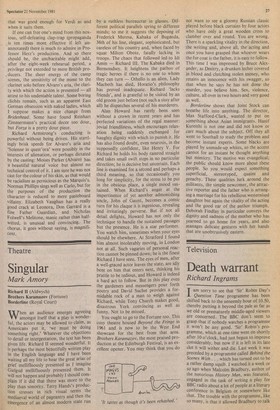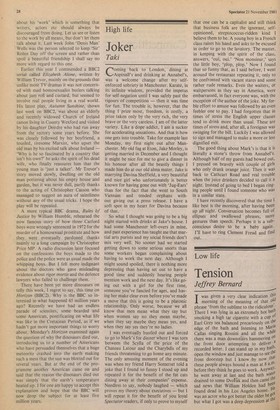Television
Death warrant
Richard In grams T am sorry to see that 'Sir' Robin Day's 1. Question Time programme has been shifted back to the unseemly hour of 10.50, thereby putting it beyond the pale as far as we old or prematurely middle-aged viewers are concerned. The BBC don't seem to grasp that if nobody watches a programme it won't be any good. 'Sir' Robin's programme, which at one time went on shortly after 10 o'clock, had just begun to improve considerably, but now if it is left in its late slot it will wither and die. Last week it was preceded by a programme called Behind the Scenes With . . . which has turned out to be a rather damp squib. I watched it a week or so ago when Malcolm Bradbury, author of the notorious History Man, was featured, engaged in the task of writing a play for BBC radio about a lot of people at a literary conference in Belgium or somewhere like that. The trouble with the programme, like so many, is that it allowed Bradbury to talk
about his `work' which is something that writers, actors etc should always be discouraged from doing. Let us see or listen to the work by all means, but don't let them talk about it. Last week John 'Denis Man' Wells was the person selected to keep 'Sir' Robin Day off the screen and rather than spoil a beautiful friendship I shall say no more with regard to this one.
Earlier this year I commended a BBC2 serial called Elizabeth Alone, written by William Trevor, mainly on the grounds that unlike most TV dramas it was not concerned with mad homosexualist butlers talking about jam roll and custard, but seemed to involve real people living in a real world. His latest play, Autumn Sunshine, shown last week on BBC2, was about an elderly and recently widowed Church of Ireland canon living in County Wexford and visited by his daughter Deirdre who had run away from the rectory some years before. She was closely followed by her boyfriend, a tousled, tiresome Marxist, who upset the old man by his excited talk about Ireland — 'Why is he so fascinated by a country that isn't his own?' he asks the spirit of his dead wife, who finally reassures him that the young man is 'just a talker'. Mr Trevor's story moved slowly, dwelling on the old man pottering about his empty house and garden, but it was never dull, partly thanks to the acting of Christopher Casson who managed to suggest an aura of saintliness without any of the usual tricks. I hope the play will be repeated.
A more typical BBC drama, Rules Of Justice by William Humble, rehearsed the now famous story of how three Catford boys were wrongly sentenced in 1972 for the murder of a homosexual prostitute and how they were eventually pardoned thanks mainly to a long campaign by Christopher Price MP. A radio discussion later focused on the confessions the boys made to the police and the police were as usual made the whipping boys. But I felt more indignant about the doctors who gave misleading evidence about rigor mortis and the defence lawyers who failed to challenge them.
There have been yet more dinosaurs on telly this week, I regret to say, this time on Horizon (BBC2). Why is the BBC so interested in what happened 65 million years ago? Recently we have had an endless parade of scientists, some bearded and some American, pontificating on what life was like in the Cretacean Period, as if we hadn't got more important things to worry about. Monday's Horizon examined again the question of why the dinosaurs died out, introducing us to a number of Americans who have persuaded themselves that a huge meteorite crashed into the earth making such a mess that the sun was blotted out for several years. But at the end of the programme another American came on and said that the reason the dinosaurs died out was simply that the earth's temperature heated up. I for one am happy to accept this explanation and hope that the BBC will now drop the subject for at least five million years.











































 Previous page
Previous page